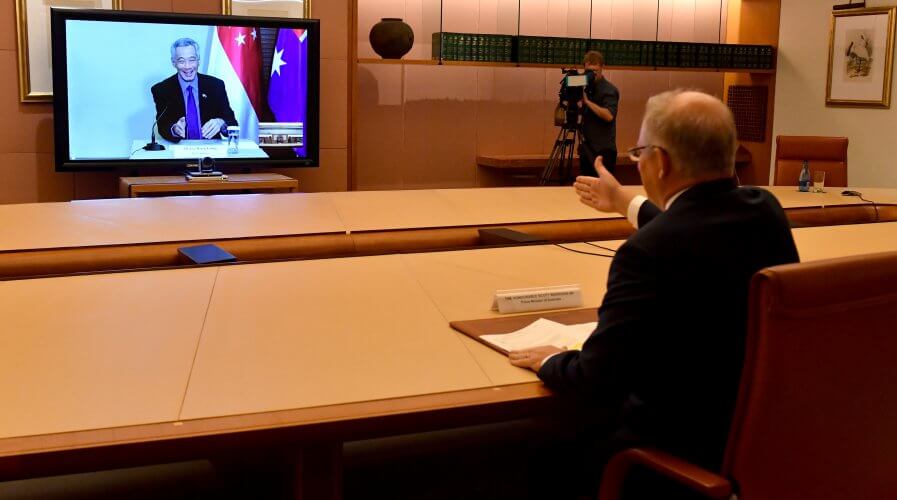
Singapore’s Prime Minister Lee Hsien Loong giving Australia’s Prime Minister Scott Morrison a virtual handshake. Source: AFP.
An ‘interoperable’ digital economy? That’s the aim for Australia and Singapore
Singapore’s Prime Minister Lee Hsien Loong shook (virtually) on a digital economy pact with Australia this past week.
The Digital Economy Agreement (DEA) will serve as a framework for the standardization of international rules, and establish interoperability between various digital systems.
It will cover key aspects such as a framework for the sharing of AI technologies best practices, cross-border data sharing projects, and the facilitation of data-sharing through e-documents.
Digital IDs are one key aspect that stands out.
Under its Smart Nation initiative, Singapore already has its own national biometric database, and is now planning to extend its usage beyond Singaporean borders.
The DEA will be looking into the feasibility of projects such as opening bank accounts and applying for visas using a standardized Digital ID.
This will reduce the time taken for processing travel applications and identity verification. Taking into account the number of Singaporeans crossing Australian borders (and vice versa), this move is significant.
With Singapore being Australia’s fifth-largest trade partner in 2019, and bilateral trade topping $16.5billion, the inking of this trade would serve to further strengthen bilateral ties, especially at a time where both countries are grappling with the coronavirus pandemic.
In the midst of chaos, Singapore has done a good job in keeping calm and carrying on, pushing forward with national agendas while keeping the virus outbreak under control.
Earlier this year, the country had also concluded similar trade agreements which aimed to facilitate greater digital connectivity with New Zealand and Chile.
Singapore’s DEA is in line with the Asia Pacific Telecommunity (APT)’s pledge to ‘co-create a connected digital future’ within the APAC region. Late last year, the governments of all 38 member countries had laid out five-year goals to achieve this, which included building digital trust and ICT infrastructure in the region together.
Given the digital state of play of both Singapore and Australia, it seems as though this would not be an issue.
It will be a challenge to achieve complete cohesion across all member countries of the APT. Regulations vary vastly across different jurisdictions, and countries would need to – in the words of APT’s secretary-general, Areewan Harangsi – drive the group’s key goals, and transact confidently with one another.
She also pointed towards Singapore’s Personal Data Protection Act as a good model for data privacy policies.
Despite being in turbulent times, agreements like the DEA is timely. While Australia is still in the thick of fighting off the current pandemic, some economies (in this case, Singapore) have already started the healing process.
When Australia bounces back from this temporary setback, the DEA would have already set in motion key digital initiatives that will help put the country’s economy back into gear.
READ MORE
- The criticality of endpoint management in cybersecurity and operations
- Ethical AI: The renewed importance of safeguarding data and customer privacy in Generative AI applications
- How Japan balances AI-driven opportunities with cybersecurity needs
- Deploying SASE: Benchmarking your approach
- Insurance everywhere all at once: the digital transformation of the APAC insurance industry


